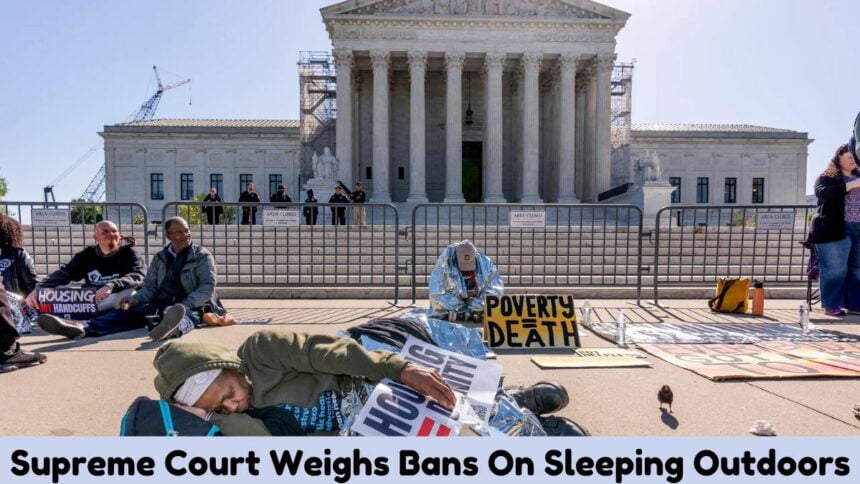When the top court in the United States asks, “Can homeless folks sleep outside?” it makes waves across the land. This question sparks big debates about being kind, what’s fair, and who fits in. Right now, the US Supreme Court is tackling this tough question: Should a rule banning homeless people from sleeping outside be okay? Let’s dive into this debate and put light on what’s at stake.
Supreme Court Weighs Bans On Sleeping Outdoors
As the nation struggles with rising numbers of people living on the streets and a shortage of shelter beds, the US Supreme Court heard arguments on Monday over whether towns can forbid homeless individuals from sleeping outside.
The lawsuit revolves around laws passed by the city of Grants Pass in the western state of Oregon, which forbade the use of any type of bedding or camping on public land after its parks started to fill up with cardboard, tents, and blankets.
Rule breakers face fines of up to $100 and, in the case of repeat offenders, a prison sentence.
Supreme Court weighs bans on homeless people sleeping outdoors https://t.co/JKMulMPSa5 pic.twitter.com/5zVGX3CJv2
— KTLA (@KTLA) April 22, 2024
Advocates for the homeless have maintained that prohibiting individuals from camping when there is nowhere else to stay amounts to “cruel and unusual punishment,” which is against the Eighth Amendment of the US Constitution.
There could be a lot riding on the nine Supreme Court justices’ judgment, which is anticipated by June 30. A 2023 count puts the number of homeless persons in the nation at a record 653,100.
Kelsi Corkran, an attorney opposing the rule, told the Supreme Court on Monday that “the ordinances by design make it physically impossible for homeless people to live in Grants Pass without facing endless fines and jail time.”
According to Corkran, the ban pushes the city’s homeless residents into other jurisdictions, making “the city’s homelessness problem into someone else’s problem.”
Grants Pass attorney Theane Evangelis justified the city’s penalties, calling them “not in any way unusual.”
Evangelis told the justices, “This court should reverse and end the Ninth Circuit’s failed experiment,” a reference to the appellate court that had invalidated the city’s regulations in 2022. The 2022 decision, according to Evangelis, “fueled the spread of encampments while harming those it purports to protect.”
The local officials received criticism from Elena Kagan, one of the three liberal justices on the conservative-dominated bench, for criminalizing a “biological necessity.”
“You could say breathing is conduct too, but presumably, you would not think that it’s okay to criminalize breathing in public. And for a homeless person who has no place to go, sleeping in public is kind of like breathing in public.”
The country’s market-rate housing stock, according to experts, is horribly behind target, leaving the United States short of the millions of homes required to meet demand and driving up costs for existing housing. Poverty, drug addiction, and a shortage of shelter beds are other elements increasing homelessness.
Have a quick look at the extra posts listed below:
- California Housing Finance Agency Accepting Applications For Dream For All Vouchers!
- Chicago Man Accused Of Armed Robbery At Wadsworth Truck Stop, Faces Charges!

